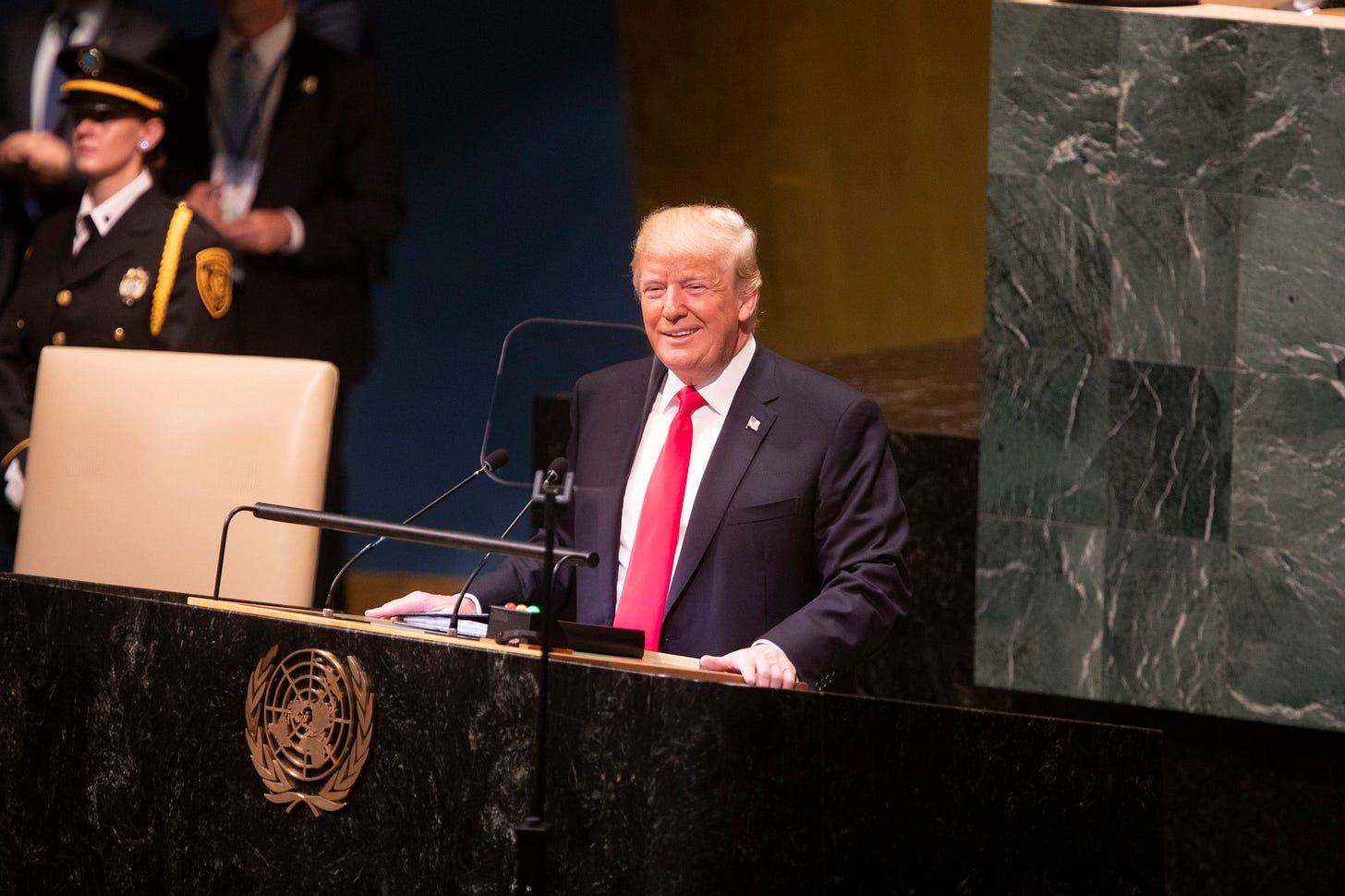President Donald Trump convened with leaders from eight Muslim-majority nations on Tuesday, September 23, 2025, during the UN General Assembly in New York, unveiling what he characterized as his most comprehensive plan yet to end Israel’s war in Gaza through a phased approach involving Arab peacekeeping forces and internationally supervised reconstruction.
The multilateral meeting brought together Prime Minister Shehbaz Sharif of Pakistan, Foreign Minister Ishaq Dar, Saudi Crown Prince Mohammed bin Salman, Qatari Emir Sheikh Tamim bin Hamad Al Thani, leaders from the UAE, Egypt, Jordan, Turkey, and Indonesian President Prabowo Subianto to discuss what Trump called “the group that can do it, more than any other group in the world”.
Trump’s Controversial UN Address Sets Stage
Earlier in his 56-minute address to the UN General Assembly, Trump strongly opposed the growing international movement toward Palestinian statehood recognition, arguing it would “reward horrible atrocities” by Hamas. “As if to encourage continued conflict, some members of this assembly are seeking to recognize a Palestinian state unilaterally,” Trump declared, directly challenging recent decisions by France, Britain, Canada, Australia, and Portugal to recognize Palestine.
Trump emphasized his demand for immediate hostage release, stating: “We have to stop the war in Gaza immediately. We have to negotiate peace immediately”. The president called for a “ceasefire-for-prisoners deal” that would secure the return of all remaining hostages, both alive and dead.
Prime Minister Shehbaz Sharif welcomed Trump’s “commitment to establishing peace in the world,” describing him as “indeed a man of peace” while recalling Trump’s previous role in preventing “a potentially devastating war between India and Pakistan”.
Comprehensive Peace Framework Emerges
According to diplomatic sources cited by Axios and Israel’s Channel 12, Trump’s plan envisions a three-phase approach: securing hostage release, negotiating Israeli withdrawal from Gaza, and establishing post-war governance explicitly excluding Hamas. The White House proposal calls for Arab and Muslim nations to deploy military forces to Gaza to facilitate Israel’s exit while providing funding for transition and reconstruction programs.
“We are willing to provide peacekeeping forces,” Indonesian President Prabowo Subianto declared at Monday’s UN conference on the two-state solution, becoming the first leader to commit troops to the initiative publicly. The proposal includes a role for the Palestinian Authority despite Israel’s historical opposition to PA involvement in Gaza governance.
Qatari Emir Sheikh Tamim bin Hamad Al Thani thanked Trump for convening “such an important meeting at such an important time,” emphasizing that leaders were united in their goal to “stop the war and bring the prisoners back” while counting on Trump’s “leadership as well to end this war and to help the people of Gaza”.
Diplomatic Challenges and Regional Dynamics
The initiative faces significant obstacles, including Israel’s recent strike on Hamas leaders in Qatar that prompted widespread Arab condemnation and threatened ceasefire negotiations. Secretary of State Marco Rubio, who met with Prime Minister Netanyahu in Jerusalem on September 15, warned of a “very brief opportunity for a deal” as Israel escalated its Gaza City offensive.
“The only way to a permanent solution to the challenge between Palestinians and Israelis is a negotiated settlement,” Rubio stated to Fox News, describing the multilateral meeting as “one last shot” at ending the conflict. He emphasized that any Palestinian territory “cannot be used as a launchpad for attacks against Israel”.
Trump’s approach contrasts sharply with international diplomatic momentum, as dozens of world leaders at the UN voiced support for Palestinian statehood recognition. French President Emmanuel Macron announced that Paris would formally recognize Palestine, declaring, “We must pave the way for peace”.
Military Escalation Complicates Peace Efforts
The diplomatic initiative unfolds amid intensifying military operations, with Israeli forces advancing deeper into Gaza City using three armored and infantry divisions. Gaza’s health ministry reported that Al-Rantissi Children’s Hospital and the Eye Hospital suspended operations due to sustained bombardments, with officials stating that “none of the facilities or hospitals have safe access routes that allow patients and the wounded to reach them”.
Over 65,000 Palestinians have died in the conflict, according to local health officials, with international monitoring organizations reporting famine conditions in parts of Gaza. The war has displaced Gaza’s entire population and drawn accusations of genocide from UN investigators and rights experts.
Jordan announced it would relocate its field hospital from Gaza City to Khan Younis after bombardments damaged equipment and threatened staff safety, highlighting the deteriorating humanitarian situation that complicates reconstruction planning.
Historical Context and Stakes
Trump positioned himself as uniquely capable of achieving peace, claiming during his UN speech that he had “ended seven wars” and lamenting that the UN offered no support for his conflict resolution efforts. “We had 32 meetings here, this is the one that’s very important because we’re gonna end something that should’ve probably never started,” Trump told Muslim leaders before formal consultations began.
The president’s emphasis on securing the Nobel Peace Prize reflects his broader foreign policy ambitions. However, his confrontational UN address, which criticized global leaders and dismissed climate change as a hoax, demonstrated his willingness to challenge international consensus.
As negotiations on Gaza remain at an impasse and Israel continues its military offensive, Trump’s multilateral approach represents the most concrete American peace proposal since the conflict’s escalation. The success of this initiative will largely depend on whether Arab and Muslim leaders are willing to commit substantial military and financial resources to a post-war Gaza governed without Hamas involvement. At the same time, Israel agrees to a complete withdrawal from the territory it has occupied for nearly two years.



